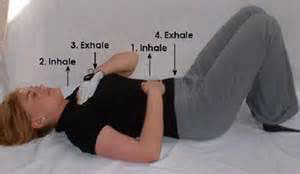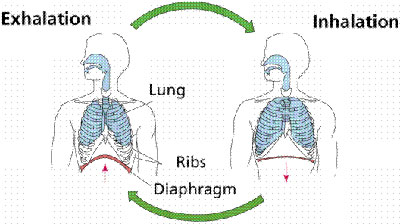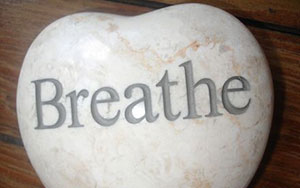| Share |  |
 | |||
A Simple Way to Boost Your Health and De-Stress
 Deep breathing is one of the simplest yet most effective ways to offset the effects of stress and improve your health at the same time. Practicing deep breathing techniques periodically can enhance your well-being in numerous ways. And the best part is that is it costs you no extra time or money!
Deep breathing is one of the simplest yet most effective ways to offset the effects of stress and improve your health at the same time. Practicing deep breathing techniques periodically can enhance your well-being in numerous ways. And the best part is that is it costs you no extra time or money!
Although breathing is one of our most vital functions, most people pay little attention to whether or not they are breathing properly. Much less do they fully appreciate how their breathing pattern can impact their health and well-being. But those who do practice deep breathing often experience decreased stress levels, less anxiety, heightened mental alertness, increased energy, improved sleep and a higher level of overall health. Reducing the risk of developing serious common diseases like heart disease or cancer is an added bonus.
How Do You Breathe?
Due to our often high-stress and fast-paced lifestyles, most people tend to breathe shallowly from their chest more than taking deep abdominal breaths. An easy way to tell how you breathe is to place one hand  on your chest and the other on your abdomen. As you breathe, notice which hand rises more. If it is the hand on your chest, you are more a chest breather. If your abdomen rises higher, it indicates that you are engaging your diaphragm and breathing more properly.
on your chest and the other on your abdomen. As you breathe, notice which hand rises more. If it is the hand on your chest, you are more a chest breather. If your abdomen rises higher, it indicates that you are engaging your diaphragm and breathing more properly.
Another way to test if you are breathing correctly is to lie down and place a book on your stomach. If you are fully expanding your lungs, the book should noticeably rise and fall each time you inhale and exhale with little movement in your chest area.
Deep versus Shallow Breathing
People who do not breathe deeply typically use only a third of their lung capacity. However, our lungs must be fully expanded for oxygen to sufficiently reach the lower lobes where the greatest amount of blood flow occurs. Oxygen is more effectively transported throughout the body from that location, resulting in increased cellular saturation levels. Since optimal health depends on a highly oxygenated environment, greater amounts of oxygen reaching cells and tissues enhances the body’s processes, accelerates its ability to self-heal and protects against disease.
 Shallow breathing, on the other hand, limits the diaphragm’s range of motion and results in less oxygen transfer to the blood. This results in poor delivery of oxygen and nutrients to cells and tissues.
Shallow breathing, on the other hand, limits the diaphragm’s range of motion and results in less oxygen transfer to the blood. This results in poor delivery of oxygen and nutrients to cells and tissues.
Because shallow breathing prevents a full exhalation as well, carbon dioxide can accumulate in the blood and lead to an overacidic blood pH (keep in mind that the lungs are the first and most important pH buffering system in the body). The build-up of carbonic acid from not exhaling fully also places additional stress on the kidneys that must filter acid wastes from the body.
Facilitating greater amounts of oxygen reaching cells with less accumulation of carbon dioxide results in cleaner blood, a more balanced pH, accelerated healing and more efficient removal of the waste and toxins that contribute to illness and disease.
The Benefits of Deep Breathing
Deep breathing benefits the body and mind in numerous ways. Though by no means an exhaustive list, the following benefits are among the most common of the many ways that deep breathing directly or indirectly contributes to our health and well-being.
Reduced Effects from Stress
Although we can’t always eliminate stress from our lives, deep breathing is an excellent way to manage it and minimize its harmful effects on our bodies. Chronic stress is linked with a number of health conditions such as cardiovascular disease, hypertension (high blood pressure), adrenal fatigue, insomnia, GI issues, increased infections and autoimmune disease. Stress also contributes to depression, anxiety and other mental health disorders.
Two branches of the Autonomic Nervous System control the body’s stress response – the sympathetic and parasympathetic nervous systems. Whether real or perceived, any type of stress activates the sympathetic nervous system’s “fight or flight” response. As the adrenal glands pump out stress hormones like adrenaline and cortisol, the body shifts to a high state of alert where heart rate, blood pressure and blood sugar levels increase. At the same time, the parasympathetic nervous system (that controls the relaxation response) is inhibited. 
Deep rhythmic breathing works to stimulate the parasympathetic nervous system and helps to shift the body away from sympathetic nervous system dominance. Activation of the relaxation response releases hormones that naturally calm the body and mind. The adrenal glands get a break from stimulation and stress hormone levels drop. Breathing, heart rate and oxygen consumptions slow down, muscles relax and the brain receives more oxygen to enhance clearer thinking. Rather than remain in “high alert” mode, the body is able to recuperate and return to normal.
Enhanced Detoxification
The body is designed to release 70 percent of its toxins through breathing. Breathing ineffectively hinders its ability to do so and causes other systems of the body to work overtime in an effort to get rid of toxic wastes.
Deep breathing helps detoxify the body by acting as a pump for the lymphatic system. Just as the flow of blood carries nutrients and oxygen to the cells and tissues, a healthy lymphatic system acts like the body’s sewer system to carry away dead blood cells, cellular waste and toxins.
Unlike the circulatory system, the lymph system does not have a built-in pump. Expanding and contracting the diaphragm with deep breathing stimulates the movement of lymph fluid and to help remove toxins from the cells and tissues of the body. Shallow or restricted breathing causes a build-up of body fluid and waste products from cellular metabolism and can lead to a sluggish lymphatic system.
Relief of Muscular Tension
Muscles tend to contract and tighten when the body does not receive enough oxygen. The increased transport of oxygen that occurs with proper breathing helps relieve physical tension and improve nervous system function that affects most every part of the body.
 Reduced Pain
Reduced Pain
The unconscious reaction to pain is to hold one’s breath but studies show that breathing into the pain actually helps to ease it. Deep breathing effectively helps to manage pain due to the way it releases muscle tension, relaxes the mind and diverts the brain’s focus away from the pain. Breathing deeply also triggers the release of endorphins (natural “feel-good” painkillers our body create) that work to improve feelings of well-being and even relieve pain. Sometimes pain occurs as a result of lack of oxygen in the tissues of the body. Flooding the body with oxygen can physically help to reduce this type of pain.
Improved Mental Concentration
The brain requires a constant supply of oxygen to function optimally. Practicing deep breathing techniques helps develop mental concentration and focus. Deep breathing at a slower rate fosters a relaxed yet alert state of mind by increasing alpha waves in the brain.
Increased Energy
The increase of blood flow that occurs when fresh oxygen reaches the lower regions of the lungs detoxifies the blood, increases circulation, improves sleep, reduces stress levels and generally helps the body run more efficiently. All of these factors contribute to higher energy levels and increased stamina.
Better Digestion
Digestive processes are controlled more by the parasympathetic branch of the Autonomic Nervous System. Because these processes shut down when the sympathetic nervous system “fight-or-flight” state takes over, activating the parasympathetic nervous system with deep breathing helps relieve symptoms of poor digestion by delivering more oxygen to digestive organs and supporting the body’s ability to digest food efficiently.
Accelerated Fat Burning
Extra oxygen in the body helps to burn up excess fat more efficiently. When we are in a stressed state, the body tends to burn glycogen (stored form of glucose held in the liver) instead of fat. Deep breathing triggers the relaxation response, which encourages the body to instead burn fat.
How to Form the Habit of Deep Breathing
Because it is often difficult to remember to breathe deeply at the time we find ourselves in any type of  distress or pain, working on developing the habit when not under stress is helpful.. By making a conscious effort to focus on the practice of deep breathing for a short period of time each day, it can become an easy and nearly unconscious part of your daily life.
distress or pain, working on developing the habit when not under stress is helpful.. By making a conscious effort to focus on the practice of deep breathing for a short period of time each day, it can become an easy and nearly unconscious part of your daily life.
To practice deep breathing, find a quiet, comfortable place to sit or lie down. First take a normal breath and fully exhale. Make sure your lungs are completely emptied before you take your first deep breath. As you follow the basic steps of deep breathing listed below, remember to take long, slow breaths through your nose and keep your breathing even and smooth (if you are unable to breathe through your nose, breath in and out through closed teeth).
- Breathe in slowly through your nose, allowing your lower abdomen to fully expand as you fill your lungs. Fill your lungs from the bottom to the top, mentally counting to four while you inhale.
- At the top of your inhale, hold your breath for a few seconds to allow oxygen to saturate your cells.
- Exhale with a long, slow finish to empty the lungs, pulling your belly button back in towards your spine to push out all of the air. Make the length of your exhale at least as long as your inhale. Some experts teach that if you can extend that time by a couple of seconds longer than the time you took to inhale, it will more readily signal your brain to turn down your sympathetic nervous system response and kick in your body’s relaxation response.
You can enhance the benefits of the above exercise by mentally focusing on letting every muscle in your body relax as you do it. In addition, you can mentally recite and meditate on a meaningful phrase or scripture while you inhale and exhale after you no longer need to count to gauge the appropriate amount of time for each step.
Practical Application Tips
 Just five to ten minutes twice a day is sufficient to practice deep breathing until it becomes second nature to you. Once you develop the habit, you can easily incorporate the practice into your daily life apart from designated times. For instance, you can take five or ten deep breaths when you first awaken in the morning and/or to help you relax as you prepare to fall asleep at night. You can also engage in deep breathing as you do your household chores, drive (stop lights make great reminders), work on your computer, sit in a meeting, watch television, etc. Pick whatever works for you.
Just five to ten minutes twice a day is sufficient to practice deep breathing until it becomes second nature to you. Once you develop the habit, you can easily incorporate the practice into your daily life apart from designated times. For instance, you can take five or ten deep breaths when you first awaken in the morning and/or to help you relax as you prepare to fall asleep at night. You can also engage in deep breathing as you do your household chores, drive (stop lights make great reminders), work on your computer, sit in a meeting, watch television, etc. Pick whatever works for you.
Breathing is something we all have to do anyway so I would encourage you to develop the habit of doing it properly. See for yourself the difference it can make in allowing you to better cope during stressful times and enjoy a healthier life.
Copyright © 2008-2015 Lucinda Bedogne, CNHP, CNC
Post Your Comment...
|
|
||||||||||||



